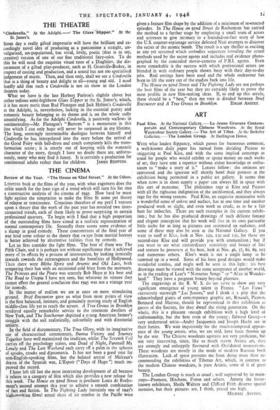THE CINEMA
Review of the Year. "The House on 92nd Street." At the Odeon.
LOOKING back at the films of the year, with what eagerness does the critic search for the least sign of a trend which will turn his list into a constructive analysis of the cinema of 1945. How hard he must fight against the temptation to make the films fit some pet theory. of relapse or 'renaissance. Conscious therefore of my peril I venture upon a theory that the work of the past year has revealed two inter- connected trends, each of them- likely to prove surprising in certain professional quarters. To begin with I find that a high proportion of the outstanding films have aimed at a realistic representation of normal contemporary life. Secondly there seems some evidence, of a slump in good comedy. These concomitants of the final year of war lend some colour to the theory that evape from martial horrors
is better achieved by alternative realities than by comedy. '
Let us first consider the light films. -The best of them was -The Fifth Chair, and it is perhaps not without significance that it achieved many of its effects by a process of introversion, by looking ironically inwards towards the extravagances and the banalities of Hollywood: Then there were Blithe Spirit and Arsenic and Old Lace, both tempering their fun with an occasional cold blast from the mortuary. The Princess and the Pirate was scarcely Bob Hope at his best and The Road to Utopia I have not seen, but whatever its virtues they cannot effect the general conclusion that 1945 was not a vintage year for comedy.
In the matter of realism we are at once on more stimulating ground. Brief Encounter gave us what from most points of view is the first balanced, intimate, and genuinely moving study of English middle-class life yet to reach the screen. A Tree Grows in Brooklyn rendered equally remarkable service to the tenement dwellers of New York, and The Southerner depicted a young American farmer's struggle with the soil realistically, colourfully and with directorial artistry.
In the field of documentary, The True Glory, with its imaginative use of characterised commentary, Burma Victory and Journey Together have well maintained the tradition, whilst The Seventh Veil carries off the psychology stakes, and Dead of Night, Farewell M3 Lovely and The Lost Weekend each carry off a palm in the spheres of spooks, crooks and dipsomania. It has not been a good year for non-English-speaking films, but the belated arrival of Malraux's drama of the Spanish war, L'Espoir (" Days of Hope ") much im- proved the record.
I have left till last the most interesting development of all because it relates to a category of film which also provides a new release for this week. -The House on 92nd Street is producer Louis de Roche- mont's second attempt this year to achieve a smooth combination of fact and fiction. In The Fighting Lady (certainly one of 1945's high-markinst_ films) actual shots of, air combat in the Pacific wete given a feature film shape by the addition of a minimum of re-enacted episodes. In The House on 92nd Street de Rochemont has carried the method to a further stage by employing a small team of actors and actresses to give intimacy to a founded-on-fact story of how the U.S. counter-espionage service defeated Nazi attempts to discover the secret of the atomic bomb. The result is a spy thriller as exciting as any yet screened which embodieS sequences revealing the actual methods used by the secret agents and includes real evidence photo- graphed by the concealed movie-cameras of F.B.I. agents. Even more remarkable is the success with which professional actors are blended in with ordinary people shown busy with their day-to-day jobs. Real settings have been used and the whole endeavour has been to lift the story out of the studios back into life.
The House on 92nd Street and The Fighting Lady are not perhaps the best films of the year but they are certainly likely to prove the most prolific in new film-making ideas. If, to end up this article, there should be a " best," then my vote is divided between Brief Encounter and A Tree Grows in Brooklyn. EDGAR ANSTEY.































 Previous page
Previous page